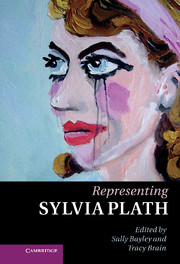Book contents
- Frontmatter
- Contents
- Illustrations
- Notes on contributors
- Acknowledgements
- Abbreviations
- Introduction
- Part I Contexts
- Part II Poetics and composition
- Chapter 5 ‘The trees of the mind are black, the light is blue’
- Chapter 6 Coming to terms with colour
- Chapter 7 ‘Madonna (of the Refrigerator)’
- Chapter 8 ‘Procrustean identity’: Sylvia Plath’s women’s magazine fiction
- Part III Representation
- Bibliography
- Index
Chapter 7 - ‘Madonna (of the Refrigerator)’
mapping Sylvia Plath’s double in ‘The Babysitters’ drafts
from Part II - Poetics and composition
Published online by Cambridge University Press: 07 September 2011
- Frontmatter
- Contents
- Illustrations
- Notes on contributors
- Acknowledgements
- Abbreviations
- Introduction
- Part I Contexts
- Part II Poetics and composition
- Chapter 5 ‘The trees of the mind are black, the light is blue’
- Chapter 6 Coming to terms with colour
- Chapter 7 ‘Madonna (of the Refrigerator)’
- Chapter 8 ‘Procrustean identity’: Sylvia Plath’s women’s magazine fiction
- Part III Representation
- Bibliography
- Index
Summary
In October 1961, two days after her birthday of 27 October, Sylvia Plath completed a poem about her and her best friend Marcia Brown’s summer 1951 jobs as live-in mother’s helpers for neighbouring families in Swampscott, Massachusetts, a wealthy community located up the coast from Boston. This essay gives a close reading of Plath’s creative process exhibited in nine drafts of ‘The Babysitters’ as they shift from an affectionate and sensual depiction of Brown in the household setting – the ‘Madonna (of the Refrigerator)’ of draft two’s title – to shared ordeals and reflections on their day-off visit to the deserted Children’s Island. Plath’s final encapsulation of this island event, where she describes the babysitters as inseparable ‘cork dolls’ floating in the salty sea water, suggests the classic Double she explored in many works, in this case a close sisterhood. The poem’s final lines, ‘And from our opposite continents we wave and call | Everything has happened’, wistfully expresses their current separation by the Atlantic Ocean the two played in, and the ten-year span between their initiation into housewifery and raising their own children among the ‘glittering tools’ of middle-class domesticity. Reverting to biography, the babysitters are referred to herein as Plath and Brown, upon whose experience the poem is undoubtedly based.
- Type
- Chapter
- Information
- Representing Sylvia Plath , pp. 129 - 146Publisher: Cambridge University PressPrint publication year: 2011



